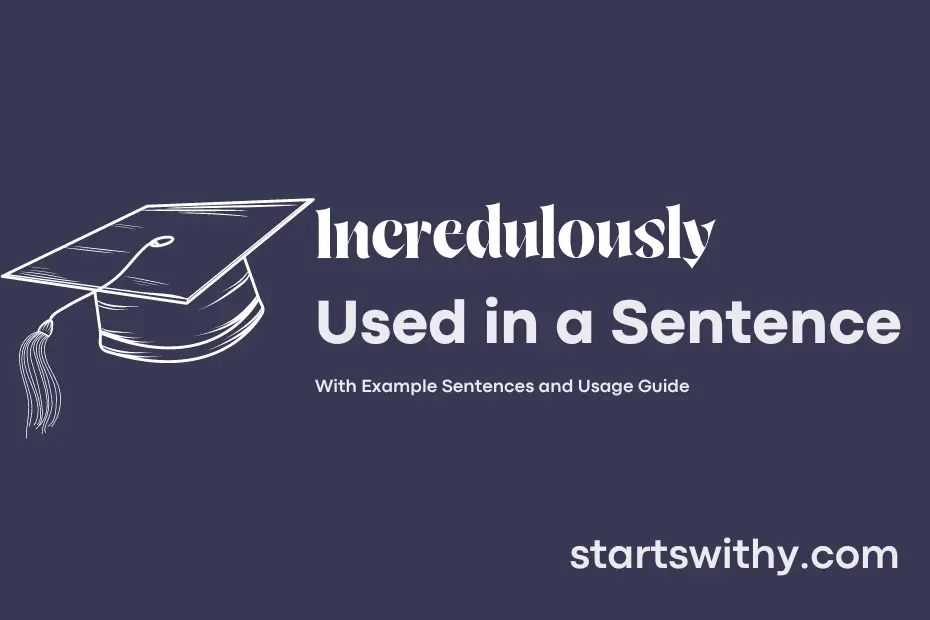Have you ever encountered a situation where you were so shocked or disbelieving that you responded with an incredulous expression or tone? When someone speaks or acts in a manner that seems absurd or unbelievable, we often react incredulously. This word conveys a sense of skepticism, surprise, or astonishment in response to something unexpected.
“Incredulously” is an adverb that describes how we express disbelief or skepticism towards a statement, action, or situation. It signifies a deep sense of doubt or confusion, often accompanied by raised eyebrows, widened eyes, or a puzzled expression.
7 Examples Of Incredulously Used In a Sentence For Kids
- Did the elephant fly? asked Ria incredulously.
- Shreya looked at the sky incredulously when she saw the rainbow.
- Rohan listened incredulously as his friend told a funny joke.
- Did the dog talk? Arjun asked incredulously.
- Riya looked incredulously at the magician pulling a rabbit out of the hat.
- Did the tree grow candy? exclaimed Anika incredulously.
- The students stared incredulously at the teacher juggling colorful balls.
14 Sentences with Incredulously Examples
- Incredulously, the professor asked if any of the students had not submitted their assignment yet.
- She looked incredulously at her friend when he suggested pulling an all-nighter to study for the exam.
- Incredulously, the classmate asked if the midterm exam was canceled.
- The student stared incredulously at the screen when he saw the low grade on his project.
- Incredulously, she realized that the lecture she had skipped was actually important for the upcoming test.
- The group of friends laughed incredulously when one of them suggested skipping class to go to the movie theater.
- Incredulously, the student asked the professor if the deadline for the research paper could be extended.
- The student raised his hand incredulously when the professor asked if there were any questions about the complex topic.
- Incredulously, she discovered that the library had run out of copies of the textbook for her course.
- The student blinked incredulously when the lecturer mentioned that the final exam would be oral instead of written.
- Incredulously, the student found out that there was a surprise quiz at the beginning of the class.
- The student’s jaw dropped incredulously as the professor announced that the final project would be a group presentation.
- Incredulously, the student realized that the course syllabus had changed without any prior notice.
- The group of students exchanged incredulous glances when the professor mentioned that the quiz would cover material not discussed in class.
How To Use Incredulously in Sentences?
Incredulously means to be unable or unwilling to believe something.
One way to use incredulously in a sentence is: “She looked at him incredulously when he told her he had won the lottery.”
Another example could be: “The teacher incredulously shook his head when the student insisted that the dog ate his homework.”
You can also use it in a question, for example: “Did she really just say that?” he asked incredulously.
When using incredulously in a sentence, make sure the context indicates doubt or disbelief. It is often accompanied by a questioning facial expression or tone of voice.
Remember to place incredulously in the appropriate spot in the sentence to convey the sense of disbelief effectively.
Practice using incredulously by incorporating it into your everyday conversations. Pay attention to how others react when you use the word and adjust accordingly.
With these tips, you should feel more comfortable using incredulously in your writing and conversations.
Conclusion
In summary, sentences using the word “incredulously” convey a sense of disbelief or skepticism towards a particular statement or situation. This adverb is often used to express surprise or doubt in a way that challenges the truthfulness or plausibility of what has been said. When someone responds incredulously, they are typically expressing their inability to believe or accept something as true.
The use of “incredulously” in sentences adds emphasis and nuance to the tone of disbelief, making it clear to the reader or listener that the speaker finds a statement or situation particularly unbelievable. By incorporating this word into their writing or speech, individuals can effectively convey their skepticism or astonishment towards a given subject, creating a vivid and impactful portrayal of their reaction.



